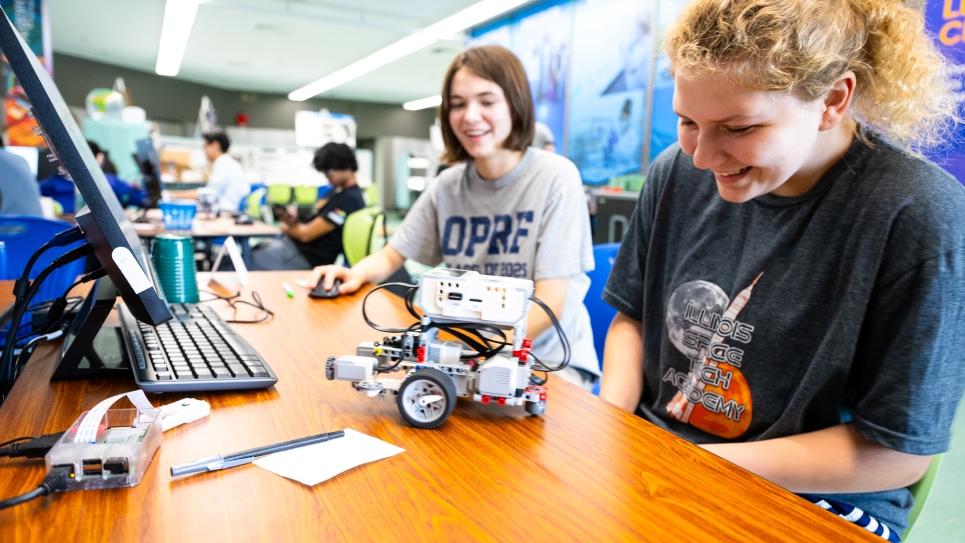
Argonne summer camps allow students to get firsthand experience with coding and computer science. Image: Argonne National Laboratory
ALCF staff contributed to Argonne’s summer computing camps to introduce middle and high school students to the fundamentals of coding.
As summer approached at the U.S. Department of Energy’s (DOE) Argonne National Laboratory, staff members found themselves looking forward to participating in the annual summer camps that help connect middle school to high school students to coding. As part of the laboratory’s commitment to support the growth of future science, technology, engineering, and mathematics (STEM) leaders, Argonne hosted two of its annual summer camps with a focus a critical field: coding and computational science.
Because the camps are centered around coding, the Argonne Leadership Computing Facility (ALCF), a DOE Office of Science user facility, plays a vital part in developing their curricula in collaboration with the lab's Educational Programs and Outreach team. Using their world-class resources and expertise, ALCF staff members teach coding lessons and lead facility tours that give students a firsthand look at the lab’s supercomputers.
“Argonne’s summer computing camps offer Chicagoland students amazing hands-on learning experiences with the support of Argonne staff. Students not only learn more about coding but have conversations with scientists and engineers who have careers in the topics being taught,” says Paige Kinsley, education outreach lead at the ALCF. “The camp content is only bolstered by tours of Argonne facilities, transforming theoretical concepts they are learning into reality.”
The first camp to kick off each summer is CodeGirls. This five-day program serves as a first step for sixth- and seventh-grade girls who are interested in learning coding with no prior experience or knowledge necessary. The camp also teaches the students the vital role that women have played throughout history in developing technology. The camp also invites lab researchers to visit the students and share how they turned their coding interests into successful careers. The girls in the camp get to work together to solve coding-related challenges, building friendships and connections along the way.
“CodeGirls is a fun way for young girls to get some exposure to programming, while also getting to meet women who use programming for a wide range of cool problems,” says Bethany Lusch, assistant computational scientist at the ALCF. “I think it's helpful for them to see that you don't have to choose between programming and other interests, like chemistry or biology, because the scope of programming is so wide.”
Like CodeGirls, Argonne’s Coding for Science Camp gives students an opportunity to get their foot in the door to the world of supercomputing. This camp is aimed at high school students, and therefore offers a more detailed and challenging curriculum. The event features programming activities that link computational science with current scientific challenges like disease modeling.
Over the course of the week-long camp, the students enhance their problem-solving and teamwork skills through hands-on activities, while discovering how computing is useful and often essential to solving problems in science. They also get an opportunity to interact with Argonne staff members who work at the forefront of high-performance computing and visualization to explore the diverse career pathways that require coding skills.
“Making Argonne’s cutting-edge work in research and technology accessible to all learners is important for developing our future workforce,” says Kelly Sturner, Argonne’s Learning Center Program Coordinator. “Our education department prides itself on creating meaningful STEM experiences for students by delivering programs inspired by Argonne science that also connect learners to scientists and staff experts in their field – this could not be accomplished without ALCF and Argonne Education working together synergistically.”
The Argonne summer camps remain a core aspect of the lab’s student outreach activities, providing opportunities for the lab to engage with and inspire the next generation of researchers.
==========
The Argonne Leadership Computing Facility provides supercomputing capabilities to the scientific and engineering community to advance fundamental discovery and understanding in a broad range of disciplines. Supported by the U.S. Department of Energy’s (DOE’s) Office of Science, Advanced Scientific Computing Research (ASCR) program, the ALCF is one of two DOE Leadership Computing Facilities in the nation dedicated to open science.
Argonne National Laboratory seeks solutions to pressing national problems in science and technology. The nation’s first national laboratory, Argonne conducts leading-edge basic and applied scientific research in virtually every scientific discipline. Argonne researchers work closely with researchers from hundreds of companies, universities, and federal, state and municipal agencies to help them solve their specific problems, advance America’s scientific leadership and prepare the nation for a better future. With employees from more than 60 nations, Argonne is managed by UChicago Argonne, LLC for the U.S. Department of Energy’s Office of Science.
The U.S. Department of Energy’s Office of Science is the single largest supporter of basic research in the physical sciences in the United States and is working to address some of the most pressing challenges of our time. For more information, visit https://energy.gov/science.